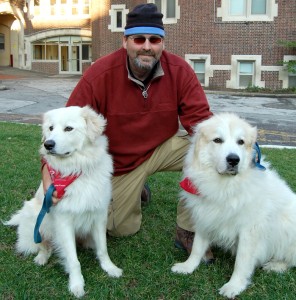Have you ever loved someone so much, that you would be willing to leave your life behind and walk across the country for him or her? Luke Robinson is doing just that, and all in memory of his beloved pooch Malcolm.

In 2004, at just six years old, Malcolm was diagnosed with bone cancer. The dog received health treatment that slowed the cancer’s progression, but it eventually reached his lungs.
After a two-year battle, Malcolm passed on. Robinson was devastated, but mourned just as the loved ones of many cancer victims do: he decided he wanted to find a cure.
After selling his truck and putting all of his belongings in storage, Robinson set out on the trip of a lifetime. In Mar. 2008, he and his two Great Pyrenees dogs, Hudson and Murphy, began a cross-country walk from Austin to Boston. Their mission is to raise awareness about canine cancer, and show that humans can benefit as well.
The walk is called “2 Dogs 2,000 Miles,” but Hudson and Murphy will have walked well over 2,000 miles on their journey. On Jun. 19, Robinson and his pups will walk the last mile into Boston with friends and supporters, following a memorial service for all those lost to cancer, human or animal.
Celebrations will follow in the Boston Common with the Puppy Up! Festival. There will be vendors, animal welfare booths, music, contests and much more. The crowd will move to the Fairmont Copley Plaza at night for dancing, dinner, and auctions.
Robinson will also launch phase two of “2 Dogs 2,000 Miles” that night. He hopes to get two million dogs to walk just two miles for cancer. This is just one more step toward aiding the study of comparative oncology.
Dogs develop cancer naturally, just like humans. Cancer research can reap the benefits of studying pets with cancer, because those cells are biologically comparable to those of humans, there is a large population of cats and dogs with pre-existing cases of cancer, and it occurs in them within years (rather than humans, who can develop it over decades).
According to 2MillionDogs.org, veterinarian oncologists believe there are between four and eight million cases of cancer in pets, and most never receive adequate treatment. If comparative oncology is increased, more pets will have access to the latest drug candidates. Additionally, grants from private and public sources will help subsidize the costs, and help more families afford treatment for their pets.
Animal testing rates would minimize, as well, because the pets do not have be given the cells to make them sick. Not only does comparative oncology aid in the quest for the cancer cure, it will help your four-legged best friend to enjoy a healthier, happier life.
Robinson, Hudson, and Murphy will be in Connecticut until the end of this week. To follow the rest of their journey, learn more about comparative oncology, and lend your support, visit 2Dogs2000Miles.org.







